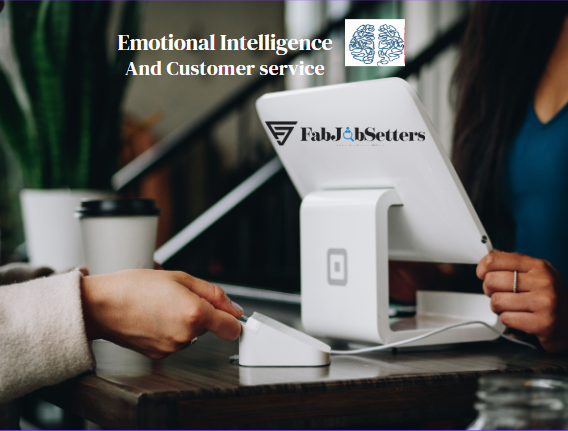Importance of Using Emotional Intelligence in Customer Service. A Tool for Building Lasting Customer Relationships

Importance of Using Emotional Intelligence in Customer Service.
Building Lasting Customer Relationship through Emotional Intelligence
Using emotional intelligence in customer service
Emotional intelligence helps one to recognize, comprehend, and control one’s own emotions as well as the perception, interpretation, and management of the emotions of others. It is essential to both professional and personal success, as it affects how people develop connections, negotiate social situations, and make decisions.
Also, emotional intelligence helps you to utilize and control your own emotions to reduce stress, communicate, sympathize with others, overcome obstacles, and diffuse situations.
Achieving great customer service requires managing your emotional intelligence.
Incorporating emotional intelligence concepts into every aspect of customer interactions is necessary to provide exceptional customer service. Emphasizing consumers’ emotional well-being and compassion. Healthy communication with customers also helps organizations make lasting impressions, foster client loyalty, and improve their reputation.

ESSENTIAL STRATEGIES FOR DEVELOPING EMOTIONAL INTELLIGENCE TO PROVIDE EXCEPTIONAL CUSTOMER SERVICE
How to use emotional intelligence to deliver exceptional customer service.
Listening More:
it is of great importance you listen attentively to your customer’s needs. Reduce your attention to your feelings when speaking with consumers. Regardless of whether it sounds unreasonable or like a glaring misinterpretation of the facts, try to put yourself in their position and comprehend how they are feeling. It is by listening more that you can understand their need, interpret their wants, and provide the right service that will meet and exceed their expectations.
The skill of active listening is fundamental to any interaction, including emotionally savvy customer service. Active listening goes beyond the superficial verbal interchange and includes:
- Fully engaging the client in conversation.
- Understanding the subtleties of their feelings.
- Reacting with sincere compassion.
Building Lasting Customer Relationship through Emotional Intelligence
This means letting go of predetermined answers and dedicating ourselves to comprehending the underlying emotions. Determine the voice tone, pitch, and tempo of the customer’s message by actively listening to non-verbal clues and aural indicators. An essential first step in improving emotional intelligence is to teach customer service professionals how to listen effectively. By doing this, the customer and the service provider establish a deeper relationship and cultivate a feeling of being heard.
Show Empathy:
In customer care service connections, empathy is the foundation of emotional intelligence. Empathy is feeling and sharing the customer’s emotions truly; it goes beyond comprehension. Customer care agents who empathize with the difficulties and annoyances that customers face foster a climate of trust and understanding.
It is influencing and empathizing with others’ feelings and assuming command of a situation by responding and using the proper body language. Empathy is a virtue. Engage in human and intimate communication with your clients. Beyond merely fixing problems, empathic answers recognize the emotional toll a problem has on the client. Adding sincere empathy to replies makes a potent difference in a world where transactions are becoming more digital. Training programs have to stress the value of empathy while offering useful resources for developing and expressing it genuinely.
ENHANCING CUSTOMER SERVICE YOUR EMOTIONS ARE CONTROLLED BY EMOTIONAL INTELLIGENCE.
Assignments in customer service include a lot of emotional interaction. Irritated, furious, or frustrated customers are common situations for representatives to handle. The customer care crew must be emotionally resilient to deal with these circumstances. A team capable of handling difficulties without becoming overly anxious or exhausted possesses emotional resilience. Self-management is the ability to restrain impulsive thoughts, feelings, and actions; healthily regulate emotions; exercise initiative; keep your word; and adjust to new situations.
Emotional Intelligence in Customer Service: Its Significance. A Mechanism for Establishing Lasting Customer Relationships
When a consumer behaves aggressively toward you, always allow yourself some time to cool off. Please recognize that the client is expressing their frustration during a heated exchange. Training in customer service should cover coping strategies, resilience-building activities, and stress management techniques. Controlling your emotions will foster a good work atmosphere where customer service professionals perform successfully despite obstacles and assist them in dealing with difficult emotional circumstances. Emotional resilience is more than simply overcoming setbacks; it’s about persevering and growing stronger as client relationships evolve.
EMOTIONAL INTELLIGENCE IN CUSTOMER EXPERIENCE
Personalize your responses:
Customize encounters, and use customer information. Refer to clients by name, note their past interactions with the business, and customize replies to meet their requirements. This individual touch shows a dedication to getting to know and cherish every client. Adapt how you present information to the customer’s preferred method of communication.
Use nice Words, be humble, and remain Calm and Patient:
Try to be humble and acknowledge that other people have different opinions than you. Recall that seldom is who’s right the most important thing, and it is far better to avoid getting into a heated argument with a disgruntled customer.
Speaking kindly and amiably to customers may have a significant impact. Positive energy is produced by kindness and politeness. Speak with warmth and empathy when choosing your words, rather than seeming robotic or cold. Customers may get angry from time to time. Service representatives should maintain composure in these circumstances. Tension can be reduced; the client might feel heard if you keep your composure and patience.
Also Read: https://fabjobsetters.com/improving-interpersonal-skills/
Summary
When it comes to customer service, emotional intelligence is what holds companies and their clients together. It’s about establishing relationships, comprehending emotions, and making connections. Simple strategies like being attentive, speaking nicely, maintaining composure, and assisting in resolving issues can help companies improve their customer service interactions. developing a deep grasp of emotions in customer service is a continuous process rather than a singular aim. Building resilience, understanding others’ emotions, being aware of our own emotions, making automatic replies feel more human, using data to understand emotions, and being sensitive to cultural differences are all necessary to achieve this. These resources offer a valuable toolkit for businesses looking to excel in emotional intelligence.
The future of customer service might be visualized as a synergy between technology efficiency and emotional intelligence. Companies that see emotional intelligence as a strategic priority will surpass consumer expectations and leave a legacy of enduring relationships and steadfast devotion. True human connection, empathy, and understanding precede transactional limits in customer care services in this emotionally intelligent future. Remember that providing excellent customer service is an emotional journey rather than a transaction. Making clients feel heard, respected, and understood is as important as fixing problems when customer service embraces emotional intelligence. Prioritizing emotional intelligence helps organizations provide exceptional customer service and leave a good and long-lasting impression on their clients’ experiences.








